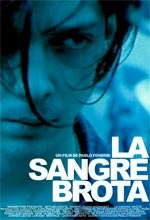CRÍTICA

-

La sangre brota, del argentino Pablo Fendrik: un animal de cinePor Diego Batlle
La sangre brota es el segundo estreno en poco más de dos meses de 2009 de un filme de Pablo Fendrik, director que —para seguir con las curiosidades— ha conseguido salidas comerciales para sus dos películas antes en Francia que en Argentina (ambas habían tenido además su premiere mundial en la Semana de la Crítica del Festival de Cannes). Así, tras el lanzamiento de El asaltante exclusivamente en el complejo ArteCinema, ahora la productora Magma Cine optó por otro lanzamiento independiente aunque bastante más amplio (seis copias) para La sangre brota.
Primero, les copio la sinopsis: Fendrik narra la historia de Arturo (Arturo Goetz), un parsimonioso taxista de 60 años que tiene que conseguir 2 000 dólares en menos de 24 horas. Su hijo mayor, Ramiro, que se fugó de la casa hace cuatro años, acaba de llamar desde Houston, Estados Unidos, pidiéndole ayuda urgente. Su esposa Irene (Stella Galazzi) guarda celosamente unos ahorros que no piensa ceder para ayudar a Ramiro. Ese mismo día, Leandro (Nahuel Pérez Biscayart), el hijo menor que aún vive con ellos, planea robarles ese dinero, comprar una partida de drogas y huir a la costa para venderla en los boliches con el propósito de reunir el efectivo suficiente para ir a buscar a su hermano mayor. Cuando padre e hijo se enfrenten por el dinero, Arturo se transformará de nuevo en aquel hombre que obligó a Ramiro a fugarse cuatro años atrás.
Ahora, lo que pienso de la película: Tras esa excelente carta de presentación que fue El asaltante, Fendrik opta en La sangre brota por un relato bastante más arriesgado, de estructura coral (hay algo del cine de Robert Altman y de Amores perros, del mexicano Alejandro González Iñárritu) y con una fuerte presencia de las calles, del tráfico y de los ríos de gente de la ciudad de Buenos Aires, en el que aborda las desventuras afectivas, económicas y laborales de varios personajes de diferentes edades, condiciones sociales y situaciones afectivas.
La relación padre-hijo, de todas maneras, es el eje de un filme sórdido, tenso, vertiginoso, visceral, urgente y con una vistosa puesta en escena sustentada en encuadres apretados para un verdadero rompecabezas humano en el que también aparecen el amor adolescente, la perversión sexual, el universo de los apostadores profesionales y, claro, la violencia y la sangre que brota ya desde el título.
Más allá de algunos excesos, de un par de innecesarias desviaciones de la trama y de ciertos regodeos formales, se trata de otra demostración de que con Fendrik estamos ante un verdadero "animal" de cine, un director con un gran presente y un inmenso futuro. La sangre brota, by the Argentine Pablo Fendrik: a cinematic creature
La sangre brota, by the Argentine Pablo Fendrik: a cinematic creature
By Diego Batlle
La sangre brota is the second release by Pablo Fendrik in little more than two months in 2009; a film director - to continue with curiosities - who has managed the commercial releases of his two films earlier in France than in Argentina (both films had also had their world premiere in the Critics’ Week of the of the Cannes Film Festival). This way, after the release of El asaltante in the complex ArteCinema, now the production company Magma Cinema chose another independent although quite greater release (six copies) for La sangre brota.
First of all, I transcribe the synopsis for you: Fendrik narrates the story of Arturo (Arturo Goetz), a parsimonious 60 year-old taxi driver who has to get 2 000 dollars in less than 24 hours. His elder son, Ramiro, who escaped four years ago from home, has just called him from Houston, the United States, to request urgent help. His wife Irene (Stella Galazzi) zealously keeps some savings which she does not think to use to help Ramiro. The same day, Leandro (Nahuel Pérez Biscayart), the youngest son who still lives with them, plans to steal that money to buy a pack of drugs and escape to the coast to sell it at the bars to gather enough cash to take back his elder brother. When father and son struggle for the money, Arturo becomes again that man who forced Ramiro to run away four years ago.
Now, I will state what I think of the film: after that excellent credentials that was El asaltante, Fendrik recurs in La sangre brota to a quite challenging coral structure story (there is something of Robert Altman’s film and of Amores perros, by the Mexican Alejandro González Iñárritu) with a strong presence of the streets, traffic and rivers of people in the city of Buenos Aires, in which the film deals with the affective, economic and labor misfortunes of several characters of different ages, social conditions and affective situations.
The relationship between father and son is, anyway, the axis of a sordid, tense, vertiginous, visceral, and urgent film with a showy Mise-en-scène sustained by cramped frames of a true human puzzle in which also appear the adolescent love, sexual perversion, the universe of the professional gamblers and, of course, the violence and blood that already sprouts from the title.
Apart from some excesses, a couple of unnecessary deviations of the plot and a certain formal redundancy, this is evidence that in the case of Fendrik we are in front of a true cinematic “creature", a film director with a great present and an immense future.
(Fuente: Otroscine)
Copyright © 2026 Fundación del Nuevo Cine Latinoamericano. Todos los derechos reservados.
©Bootstrap, Copyright 2013 Twitter, Inc under the
Apache 2.0 license.

